In recent years, migration has become an increasingly pressing global issue, with millions of people displaced from their homes due to conflict, persecution, economic hardship, and environmental factors. Among the many countries grappling with the challenges of migration, Rwanda has emerged as an unexpected destination for some migrants. However, the question arises: who are these migrants being sent to Rwanda, and what factors contribute to their displacement?
Rwanda’s journey from the depths of genocide to becoming a beacon of hope and stability in Africa is nothing short of remarkable. The genocide against the Tutsi in 1994 left the country devastated, with hundreds of thousands of lives lost and deep scars etched into the nation’s collective memory. In the aftermath of this tragedy, Rwanda embarked on a remarkable path of reconciliation, justice, and development under the visionary leadership of President Paul Kagame.
Despite the immense challenges posed by its history, Rwanda has shown remarkable resilience and determination to overcome its past and build a better future for its people. Central to this effort has been the promotion of unity and reconciliation among Rwanda’s diverse population, fostering a sense of national identity and belonging that transcends ethnic divisions. Through initiatives such as the Gacaca courts, which facilitated community-based justice and reconciliation, Rwanda has sought to confront the horrors of its past while promoting healing and forgiveness.

Also Read: Involuntary Relocation and Migrants in Morocco
In parallel with its internal reconciliation efforts, Rwanda has also emerged as a proactive and engaged participant in international affairs, particularly concerning issues of migration and refugee crises. Recognizing the importance of global solidarity and cooperation in addressing these complex challenges, Rwanda has been willing to lend its support and expertise to international initiatives aimed at protecting the rights and well-being of refugees and migrants. One notable example of Rwanda’s commitment to international cooperation on migration issues is its collaboration with the United Nations High Commissioner for Refugees (UNHCR) and the African Union to host refugees and asylum seekers stranded in Libya. By offering a haven to vulnerable individuals fleeing conflict and persecution, Rwanda has demonstrated its willingness to extend a helping hand to those in need, even beyond its borders.
Moreover, Rwanda’s engagement in hosting and supporting refugees and migrants reflects its broader commitment to principles of solidarity, compassion, and human dignity. Despite facing its challenges, including limited resources and infrastructure, Rwanda has shown a willingness to prioritize the needs of others and contribute to collective efforts to address humanitarian crises.
In doing so, Rwanda not only reaffirms its status as a responsible member of the international community but also underscores its belief in the fundamental importance of upholding the rights and dignity of all individuals, regardless of their nationality or circumstances. By extending hospitality and assistance to refugees and migrants, Rwanda embodies the spirit of Ubuntu – the African philosophy that emphasizes the interconnectedness of humanity and the importance of mutual support and compassion.
In essence, Rwanda’s engagement in addressing migration and refugee crises is emblematic of its broader commitment to peace, stability, and human rights. Through its actions, Rwanda sends a powerful message about the possibility of overcoming even the darkest chapters of history and building a future defined by hope, resilience, and solidarity. As the country continues on its journey of reconciliation and development, it serves as an inspiring example for the rest of the world, demonstrating the transformative power of compassion, forgiveness, and collective action.

The relocation of refugees and asylum seekers from Libya to Rwanda represents a crucial response to one of the most pressing humanitarian crises of our time. The situation in Libya has long been a source of concern, particularly for migrants and refugees who often find themselves trapped in a perilous limbo, facing exploitation, abuse, and violence at the hands of smugglers, traffickers, and even authorities.
The conditions in Libya’s detention centers, where migrants and refugees are often held indefinitely in overcrowded and unsanitary conditions, have been widely condemned by human rights organizations. Reports of torture, sexual violence, and forced labor are disturbingly common, highlighting the urgent need for action to protect the rights and well-being of those stranded in Libya.
In response to these dire circumstances, the United Nations High Commissioner for Refugees (UNHCR) and the African Union, recognizing the need for urgent intervention, joined forces with the Rwandan government to launch a groundbreaking program to evacuate and resettle vulnerable refugees from Libya to Rwanda. This initiative represents a powerful example of international cooperation and solidarity in the face of a humanitarian emergency, demonstrating a collective commitment to upholding the rights and dignity of all individuals, regardless of their nationality or status.
By offering a lifeline to refugees and asylum seekers stranded in Libya, Rwanda is not only providing immediate relief to those in desperate need but also sending a clear message about the importance of compassion and solidarity in addressing complex global challenges. The decision to host refugees from Libya underscores Rwanda’s commitment to its values of humanity, dignity, and respect for human rights, reaffirming its status as a responsible member of the international community.
Moreover, the program to relocate refugees from Libya to Rwanda represents a concrete example of how innovative and collaborative approaches can make a tangible difference in the lives of vulnerable individuals. By working together, the UNHCR, the African Union, and the Rwandan government have created a pathway to safety and protection for those who have endured unimaginable suffering and hardship.
However, it is essential to recognize that the relocation of refugees from Libya to Rwanda is just one part of a broader response to the migration crisis in Africa and beyond. While initiatives like this offer immediate assistance to those in acute need, they must be accompanied by efforts to address the root causes of displacement and create conditions for sustainable peace, stability, and development in the countries of origin. Ultimately, the program to relocate refugees from Libya to Rwanda serves as a powerful reminder of the importance of solidarity, compassion, and collective action in addressing humanitarian crises. In extending a helping hand to those in need, Rwanda not only demonstrates its commitment to its own values and principles but also sets an inspiring example for the rest of the world to follow.

Also Read: Migration and Technology
The migrants being sent to Rwanda under this program are primarily individuals who have fled conflict and persecution in their home countries, often in regions such as the Horn of Africa and the Sahel. They include refugees and asylum seekers from countries like Eritrea, Somalia, Sudan, and South Sudan, among others. Many of these individuals embarked on difficult journeys across the Sahara Desert and the Mediterranean Sea in search of safety and better opportunities, only to find themselves trapped in Libya’s precarious situation.
Rwanda’s decision to participate in this initiative reflects its commitment to international solidarity and humanitarian principles. By offering a safe haven to these vulnerable migrants, Rwanda not only alleviates their immediate suffering but also contributes to broader efforts to address the global refugee crisis. Moreover, Rwanda’s involvement sends a powerful message about the importance of collective responsibility in responding to humanitarian emergencies and protecting the rights of refugees and migrants.
However, the relocation of migrants to Rwanda is not without its challenges and complexities. Despite the government’s efforts to provide assistance and support to incoming refugees, there are concerns about the capacity and resources available to ensure their successful integration and long-term well-being. Rwanda, like many other countries hosting refugees, faces constraints in terms of infrastructure, employment opportunities, and social services, which could potentially strain its ability to accommodate large numbers of newcomers.
The relocation program initiated by Rwanda, while undoubtedly providing immediate relief to refugees and asylum seekers, raises pertinent questions regarding its long-term sustainability and its broader implications for migration dynamics across Africa. While such initiatives are commendable for their humanitarian focus, it is crucial to acknowledge that they represent only a temporary solution to the complex and multifaceted issue of displacement.
One key concern revolves around the sustainability of the relocation program. While Rwanda has demonstrated a willingness to host refugees from Libya and provide them with safety and support, questions linger about the capacity of the country to accommodate a potentially large influx of migrants over the long term. Rwanda, like many countries in Africa, faces its own developmental challenges, including limited resources, infrastructure, and employment opportunities. The strain on these resources could pose significant challenges to the successful integration and well-being of refugees in the host country.
Moreover, the relocation program’s implications for broader migration dynamics in Africa warrant careful consideration. While initiatives like the one in Rwanda may offer a lifeline to specific groups of migrants in urgent need, they do little to address the underlying drivers of displacement or to provide durable solutions for those forced to flee their homes. Without addressing these root causes, such as conflict, persecution, poverty, and environmental degradation, migration flows are likely to persist, potentially overwhelming the capacity of host countries and exacerbating existing tensions and inequalities.
To achieve lasting progress in addressing migration challenges, there is a pressing need for comprehensive approaches that go beyond short-term humanitarian responses. Central to these efforts is the need to address the root causes of displacement by promoting peace, stability, and development in countries of origin. This requires sustained investment in conflict prevention, peacebuilding, and socioeconomic development, aimed at creating conditions that enable people to rebuild their lives and livelihoods in their own communities.

Also Read: Detention and Deportation
Furthermore, promoting regional cooperation and dialogue is essential for addressing the complex and interconnected nature of migration in Africa. By working together, countries can develop more effective strategies for managing migration flows, protecting the rights of migrants, and addressing common challenges. This includes strengthening mechanisms for refugee protection, enhancing border management and security, and fostering greater economic integration and cooperation.
Ultimately, while initiatives like the relocation program in Rwanda play a valuable role in providing immediate assistance to those in need, they must be part of a broader and more holistic approach to migration governance. By addressing the root causes of displacement, promoting peace and stability, and fostering regional cooperation, countries can work towards creating a more sustainable and equitable future for all people, regardless of their nationality or circumstances.
The migrants being sent to Rwanda represent a diverse group of individuals fleeing conflict, persecution, and hardship in their home countries. Rwanda’s participation in initiatives to relocate and support these migrants demonstrates its commitment to humanitarian values and international cooperation. However, the challenges associated with hosting and integrating refugees highlight the need for sustained efforts to address the root causes of displacement and build a more inclusive and resilient global community. By working together and upholding the principles of compassion and solidarity, countries can create a safer and more prosperous future for all people, regardless of their nationality or circumstances.


Pingback:How is Europe responding to the Migration Crisis? - Aidez nous a Aider